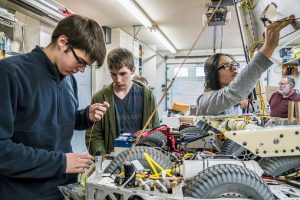 If we told you that high school students can earn high school credits while taking hands-on skill training that prepares them for high-wage, high-demand careers, would you say that sounds too good to be true? It’s true, it happens in every state, and it’s called “career and technical education,” or CTE.
If we told you that high school students can earn high school credits while taking hands-on skill training that prepares them for high-wage, high-demand careers, would you say that sounds too good to be true? It’s true, it happens in every state, and it’s called “career and technical education,” or CTE.
CTE programs provide training in a wide variety of fields. They are offered in high schools, community and technical colleges, career centers, and four-year colleges. Programs are developed within a framework of 16 different career clusters:
- Agriculture, Food & Natural Resources
- Architecture & Construction
- Arts, A/V Technology & Communications
- Business Management & Administration
- Education & Training
- Finance
- Government & Public Administration
- Health Science
- Hospitality & Tourism
- Human Services
- Information Technology
- Law, Public Safety, Corrections & Security
- Manufacturing
- Marketing
- Science, Technology, Engineering & Mathematics
- Transportation, Distribution & Logistics
When students complete programs and their high school education, they may go on to work right away, but many pursue further technical training, certifications, or a two- or four-year degree.
CTE program results
The statistics for participants are impressive—high school students involved in CTE are more engaged, perform better and graduate at higher rates:
- Graduation rates for students in CTE programs is 93 percent; the average for all students is 80 percent.
- More than 75 percent of CTE students pursue higher education or training shortly after high school.
- About 30 percent earn college credit and/or an industry certification while they’re in the program.
How does it work?
Program designs vary, but students might spend two afternoons each week in a training class, and three afternoons a week in a real work setting, learning technical and employability skills in the career field of their choice. Students typically have a mentor or supervisor on site to guide their skill development.
Frequently, CTE programs find corporate business partners that provide projects, equipment, and supervision for the hands-on component of CTE. Projects could include volunteer service, internships, job shadowing, presentations, or creating an event. There might be guest instructors from professional fields, and tours or site visits to a variety of work settings. In addition to developing technical and employability skills, students gain knowledge that helps to determine their future career preference or direction.
Examples of CTE activities
Students in CTE programs across the country have:
- Earned a culinary arts and restaurant management certification
- Studied for, practiced, and earned, Red Cross certification
- Obtained a certification for CNA, EMT, or basic firefighting
- Operated a radio station and created a cable television program
- Staffed a greenhouse and livestock facility
- Developed a marketing plan for a small business
- Managed a school store and run a coffee shop
- Designed and built a house
- Gained work experience and training in physical therapy, dental care, radiology, and veterinary services
- Wrote computer code to program robots for a manufacturing process
- Learned blueprint reading, metal varieties, and cutting tools for machinist training
- Studied aircraft maintenance and flight electronics
- A few programs even own their own fleet of aircraft and offer a pilot training program approved by the Federal Aviation Administration.
Learn more about the CTE programs in your state, or about the career and technical education cluster system.
To explore careers in each of the 16 career clusters, check out CareerOneStop’s Occupation Profiles or Career Videos. You can also find information on professional certifications for a wide variety of occupations, and research your local training resources.
The Association for Career and Technical Education is the largest national education association dedicated to the advancement of CTE programs. CareerOneStop will attend their annual conference, CareerTech VISION 2017, December 6-9 in Nashville, TN. If you’ll be at the conference, please stop by our booth #143 for a visit.
